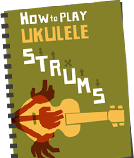All to often, the ukulele is dismissed as a toy instrument – not capable of real musicianship. So I was delighted to find out the Victoria College of Music (VCM) will be offering exams in the ukulele up to grade 5 from this summer. I tapped the man writing and arranging the ukulele exams, Colin Tribe, for more information.
What is the VCM?
VCM is the Victoria College of Music, the smallest of the music examining boards in the UK. Established in 1890 it did not join the Associated Boards of Music because it was keen to keep an individual identity that it has still got, offering exams in a wider range of instruments than other boards. It does Electronic Keyboard , Ocarina, Mandolin, Bass Guitar, Accordion and many others. You can find full details on their website.
What will the ukulele exam consist of?
The exam will be in presented in this first version as 9 grades A,B,C,D (suitable for younger beginners but not exclusively – I have examined an 80 year olds taking grade A on piano) Then 1,2,3,4,5 which are comparable with grades on any other instrument.
The speed which you can progress through these is not specified and you do not have take one grade before going to the next, for instance someone could take grade 5 as their first exam. Going beyond grade 5 is a distinct possibility including Medals and diplomas, but we wanted to get started with these grades.
Tablature is the simplest way to show where the notes are on the instrument, and by combining it with standard notation, a fairly common practice for modern guitarists, you get the mixed system I have used which I think is as clear and complete a guide to the music as is possible. All the music is arranged for the more common types of Ukulele (Soprano, Concert and Tenor) using high G,C,E,A tuning although other version will be available on request.
What techniques are required at each level of playing?
Any right hand playing techniques will be allowed, so long as the musical ideas are performed. Some pieces will work with just an old fashioned felt pick or a combination of thumb and first finger. Some of the higher grade pieces demand a 4 finger style aproach, but the variety of pieces gives a wide degree of choice.
Grade A and B mainly single string melodies within the first 3 frets
Grade C and D some easy rhythmic strummed sections with an embedded melody line. only occasionally above fret 5
Grade 1 Semi quavers added in more complex rhythms, some melodies above the 5th fret
Grade 2 Triplets and sustained notes
Grade 3 Up to the 12th fret
Grade 4 Opportunities for improvised sections
Grade 5 More complex musical ideas
Which pieces and theoretical knowledge will be required for each grade
Grade A First Steps: Dancing Pawns, Twinkle, Twinkle Little Uke.
Scales Arpeggios and Chords C major
Grade B Preliminary: Aunt Nancy, On top of Old Smoky
Scales Arpeggios and Chords C major, D major
Grade C Preparatory: John Brown’s Body, Little Brown Jug
Scales Arpeggios and Chords D major, D minor
Grade D Advanced Preparatory: Daisy, Daisy, The Seamaster Strum
Scales, Arpeggios and Chords C major, C minor
Grade 1: Three from- Auld Lang Syne, Rockin’ On!, Silent Night, Strum Along with Me,
Waltzing Matilda.
Scales Arpeggios and Chords G major, F major
Grade 2: Three from- 12 to the Bar, Au Claire de Lune, First Love, Greensleeves,
Those were the Days
Scales Arpeggios and Chords A major, E major, A harmonic minor, E harmonic minor
Grade 3: Three from- Pirates Medley, Prelude in G, Regency Quadrille, Saltash Blues, Yellow Bird
Scales Arpeggios and Chords A flat major, E Flat major, G harmonic minor, F harmonic minor
Grade 4: Three from- Ain’t She Sweet, Ajeeb dastan hain yeh, El Condor Pasa, Great Western Waltz, Irish Washerwoman
Scales Arpeggios and Chords F sharp major, F sharp harmonic minor,
Chords and Inversions C,C7, C diminished, A minor
Grade 5: Three from- Alphabeta, Chocolate Lime Juice, Dem Dry Bones, Sonatina in A, Sweet Georgia Brown
Scales Arpeggios and Chords D flat major, C Melodic minor,G major and G harmonic minor on strings 1 and 4.
All these pieces, composed or arranged by Colin R Tribe specifically for the exams, will be published in a VCM series I hope to call “Uniqulele” which also includes notes on the pieces and playing techniques.
At all grades it is also possible to substitute one piece with a song chosen from the VCM Self-Accompanied Singing syllabus for which
Grades A-D are published in a special “Self-Accompanied Singing” Ukulele version.
What do examiners look for in a performance?
They look for a combination of skill, knowledge and understanding. Questions are asked in a manner which assesses the candidate’ depth of understanding, not merely the ability to repeat definitions (this applies to understanding the notation they are using and any technical terms in either tablature or stave). Ingenuity, variety, musicianship and a sense of style are rewarded as well as technical skill and musical accuracy. The examiners will rarely be ukulele players but they are all highly experienced musicians, players and teachers who understand the musicality being displayed.
How do you apply for and enter Ukulele grades?
The Victoria College of Music has a website and Robin Wood the Chief Executive can give details of secretaries and centres where exams are conducted nationwide and indeed as far afield as Ireland, Sri Lanka, Malta and the Isle of Wight! The address for letters is
52 Bedford Row, London, WC1 4 LR
Tel./Fax: (020) 7405 6483
Email: Click here
A big thanks to Colin for answering the questions. He was also kind enough to let me post the tab for his arrangement of Spinning Wheel:



dude i’m psyched for this VCM business. looks hella cool